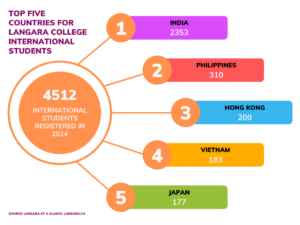
Greater Vancouver Food Bank faces criticism for “guideline” on international students
The guideline that limits first year international students from accessing food aid will remain in place
By KORALEE NICKARZ
The Greater Vancouver Food Bank will uphold their guideline limiting international students from accessing aid during their first year of study despite harsh responses from critics.
According to CEO David Long, the Vancouver food bank’s guideline was created in response to a “massive influx of international students” as well as social media posts and videos suggesting that food banks were a source of free food.
Describing the guideline as not a “hard fast policy,” Long said that there is some flexibility to ensure they help students facing food insecurity.
“Our mandate is for people in need.” said Long, “If you’re coming to Canada as an international student, it’s great, if you have money in the bank, you don’t really fit our criteria.”
Food insecurity, by the numbers
The federal government requires international students to have $20,635 in available funds to study in Canada, which amounts to $1,719.58 per month over the course of one year.
“When they come to Vancouver in particular, I know that doesn’t work,” said Long, adding that, in spite of the policy, no international student who needs real help will be or has been turned away by the Vancouver food bank.
According to Statistics Canada, roughly 25 per cent of post-secondary students in Canada are at risk of food insecurity.
Students have a right to food
Graham Riches, a former University of British Columbia professor and author of the book “Food Bank Nations: Poverty, Corporate Charity and the Right to Food,” said he disagrees with the Vancouver food bank policy.
“International students are human beings and there’s a moral imperative to feed hungry people; and if a charity denies that, it is in violation of… its own code of conduct, its own code of ethics,” he said.
Dan Huang-Taylor, executive director of Food Banks BC, said that the proportion of B.C. post-secondary students visiting food banks more than doubled from 2019 to 2023.
Daniel Mikolela Agosta, a Kenyan international student in the Langara Health Sciences program said that requiring international students to wait until they have no money in the bank to access assistance is dangerous.
Agosta added that denying international students access to the GVFB for their first year is unreasonable, because it is a very long time.
“I don’t see any international students highly exploiting it,” Agosta said.
Ian Marcuse, a community food organizer and coordinator for Vancouver Neighbourhood Food Networks, said: “Everyone should have access to food if they’re in need. That’s just the bottom line.”
Systemic maltreatment
Rowan Burdge, provincial director of the BC Poverty Reduction Coalition said the framing of international students as taking advantage of support is “extremely xenophobic and hypocritical.”
The most recent Food Banks Canada HungerCount, an annual report documenting national food bank use, also identifies racialized people as “more likely to report food insecurity.”
A 2023 report published by the BC Federation of Students identifies a harmful stereotype that international students come from wealthy families and thus have endless financial means.
The report called the stereotype “nothing more than a thinly veiled justification – with racist undertones – of the systematic and institutional maltreatment international students face.”

VIDEO: Listen to Graham Riches’ thoughts on the Greater Vancouver Food Bank on the Voice‘s YouTube channel

Comments are closed.